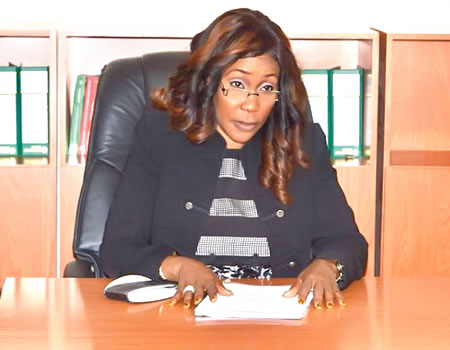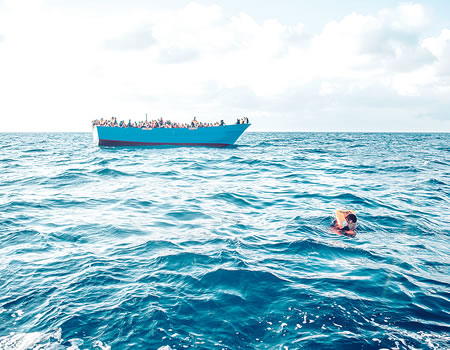What has been the reaction of your agency to the report of sale of Nigerians into slavery in Libya and the deportation of some others?
The issue of Libya is one that has been of great concern to us over the years because of the rate of deportations that we have recorded from tham country. It is important to know that from Libya, we have had over 4,000 people deported who were illegal migrants to that place in the last one year. These people return virtually every week. These are people who have been used, dejected, who have lost hope. What is happening is actually one of the effects of illegal migration that we have been speaking against. Over the years, we have continued to tell people not to travel to places where they are not sure of what they are going to do and Libya is a place that is actually not a destination for our people. It is actually a transit because people deceive them that they would go through the desert through North Africa, pass through the Mediterranean Sea to Europe and many people have died on the way to Libya. What happens in Libya is that as they are waiting, looking for a way of crossing, they are being exploited, sold and resold at different amounts to different people and there is no hope. Many of those who eventually went to the sea have died but those who are there are looking for a way to come back home. That is why the statement of the president that actions will be taken to bring them back those who are interested in coming back is very germane at this time.
Now, this 4,000 in the past one year, were they predominantly female or male?
In fact, they are mainly males. There are times they come back like this, about 200 and you discover that only about three or four females are there. But the fact is that most of these people are actually not drifters; they are victims of smuggling because they are looking for a way to Europe where they feel the grass is greener. They have paid people to cross them over but they are not able to cross over. Now, they get them involved in all manner of petty crimes in those places. Many of them are actually put on the plane to come back from jail. Many of them are serving jail terms in Libya because of crimes they have committed or some charges that have been brought against them. So, they are also in those camps awaiting repatriation.
From your investigations, do you have an idea of how many Nigerians are in jail in that part of the world now?
It is actually difficult for us to know because what we have is data concerning those who are coming home, because everyday people are moving towards that area looking for how to move out. It is just like asking me how many Nigerians are victims of trafficking. I wouldn’t know, too, because such activities are clandestine in nature. It may be happening around you and you may not even know that that is exactly what is being negotiated. So, it is difficult for us to know the number of people that are in jail in that place. Maybe the minister of foreign affairs has the data.
What rehabilitation methods are you putting in place for the people that come back?
Our business is to deal with victims of human trafficking and not all those who are deported. Like I said, the majority of people who are deported are not necessarily victims of human trafficking. When they come back, what we do at the airport is that we go there, profile the people that have returned. Those who are victims of human trafficking are the ones we take to our shelters.

Then we also look at those that are identified as rascals and we take them into our cells, detention camps for prosecution. Now the ones we take into our shelters are given psychosocial assistance and we try to know what their problems are, what kind of trade and vocation we can assist them with. When we know some of these things, we are able to help them. It will interest you to know that many of these people still want to go back to school and we find means of sending them back to school.
How many people have you assisted that way in the last one year?
In the last one year, I can tell you that many have gone to school. In the last four months, two of the former victims have graduated from the university where they studied accounting. One of them had a degree, second class upper division, from Redeemers University. Two others are currently serving. There are many like that.
The traffickers, how many have you convicted?
We have had over 334 convictions since we came on board and there are many other pending cases scattered acress the various courts in the country. So, we have 10 office commands, including the headquarters in Abuja. So, there are cases in different commands.
I was wondering whether this trafficking or wilful sale of oneself into slavery is a Southern Nigerian phenomenon.
We cannot say wilful sale of oneself because I do not think that is what it should be called. It is human trafficking, through and through, because somebody has deceived somebody to say ‘I have an offer for you to go and work’. It could be a big city in Nigeria, moving the person from the rural community to the city. It could be from Nigeria to Europe or any other part of the world. But the people are being deceived one way or another. They are told that the grass is greener on the other side or they are going to be sent to school. But unfortunately, by the time they get there, the case is not the same. Someone may have been told that she would work in a restaurant but on getting there, she gets introduced to prostitution and then she starts sleeping with over 20 men a day and she is not even keeping the proceeds from her work. You cannot say that someone wilfully give herself to sleeping with that number of men without collecting the money. The traffickers are the ones collecting all these monies and by the time the person gets freedom, the person’s life is already wasted. I don’t think anybody in the right frame of mind will go and labour for another person.
Which one of your offices across the country is the busiest?
Our busiest offices are in Lagos, Abuja, Benin and Kano.
What could be responsible for that, especially Lagos?
Lagos is a big city and everyone wants to go to Lagos. Our neighbouring countries see Lagos and Nigeria the way Nigerians also see countries like the United States, United Kingdom and think they can make a lot of money there. There are also international borders in Lagos. So, it is easier for people to move in and out.
WATCH TOP VIDEOS FROM NIGERIAN TRIBUNE TV
- Let’s Talk About SELF-AWARENESS
- Is Your Confidence Mistaken for Pride? Let’s talk about it
- Is Etiquette About Perfection…Or Just Not Being Rude?
- Top Psychologist Reveal 3 Signs You’re Struggling With Imposter Syndrome
- Do You Pick Up Work-Related Calls at Midnight or Never? Let’s Talk About Boundaries







